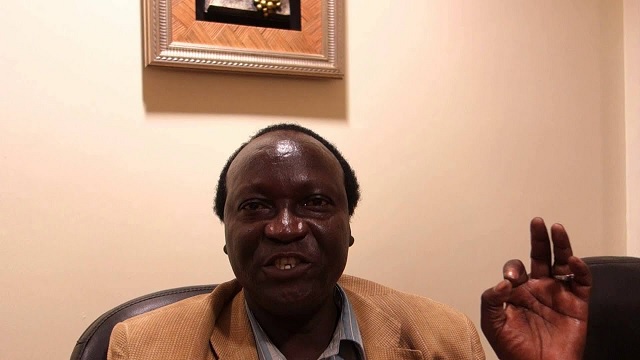
OBITUARY | By By Ronald Musoke | When the 25th UN climate conference opens in Santiago, Chile, this December; the Ugandan delegation will be missing one usual member –Chebet Maikut. He died suddenly on Oct. 02— exactly two months to the next round of climate change talks scheduled for Dec.02-13.
As a commissioner in the Ministry of Water and Environment, he has been head of the Climate Change Unit which he is credited for setting up from scratch.
Maikut was tasked with providing the leadership, management oversight, and technical support to climate change action in the country. He also supported networking and building partnerships by coordinating, representing the country and liaising with several people on issues of climate change in Uganda.
Quiet and unassuming, Maikut has been Uganda’s leading climate change negotiator for years. As soon as news broke of his death, tributes poured in from both within and outside Uganda. On both the Water ministry social media platforms and his Sebei community Facebook page known as Sebei Nation, mourners eulogized and praised Maikut for being a man of “quality, competence and character.” The UNDP via its twitter feed eulogized Maikut for his contribution towards connecting the global community in climate negotiations. UNDP called Maikut “a gallant champion against climate change.”
Global climate change conferences are renowned for being quite complex drawn-out negotiations often extending into the wee hours of the night but colleagues say Maikut always remained engaged with global negotiators. He often led teams from East Africa in pushing for an agreement that commits developed countries to support climate change adaptation in developing countries.
Maikut understood both the science and politics of climate change. In May 2017, ahead of the climate change conference in Bonn, Germany, he told The New York Times that there was need for a rule book to rein-in some of the world’s biggest companies after observing the role corporate lobbyists play in the UN climate change negotiations.
“These corporations are so powerful,” Maikut said, “Uganda’s economy is less than a tenth of the market capitalization of fossil fuel giants, Exxon Mobil. We need a stronger rule book,” he said.
But he also knew well the paradox of international climate change negotiations where, for instance, the most vulnerable rarely get what they deserve. Ahead of the 2015 Paris climate conference, he said there was need for the international community to support mitigation efforts for climate change for countries like Uganda that scientists have assessed as vulnerable.
In most of the international climate change forums, Maikut described how a country like Uganda which is not responsible for climate change, is already suffering from the impacts of climate change.
In 2016, for instance, Uganda experienced its worst dose of climate change variability; with several parts of the country taking in very hot temperatures interspersed with short erratic rains. This phenomenon affected agricultural productivity leading to food shortage, death of livestock, floods and death of people. Based on these facts, Maikut has been pushing for increased funding by the developed countries to vulnerable countries.
“Uganda has not caused emissions but when it comes to impacts such as erratic rainfall patterns, droughts or floods, we continue to be impacted. Therefore, the issue of adaptation should be part of the Paris Agreement,” he said.
Maikut kept reminding other international negotiators that Uganda like most developing countries emit less greenhouse gases yet it is more vulnerable to the negative impacts like unreliable rainfall, increase in temperature and prolonged drought among others.
“Developing countries feel that they are being asked to shoulder a disproportionate share of mitigation measures,” he said, “At 1.39 million tonnes of carbon dioxide per capita annually, Uganda is the lowest emitter among the least developed countries in the African group and yet it has been forced to commit to a 22% reduction by 2030.”
He is credited with preparing the so-called nationally determined contributions— an action plan required for the implementation of the Paris Agreement for limiting global temperatures rise below 2°C above pre-industrial levels to prevent a catastrophic warming of the planet.
Maikut has been the chairperson of the Board of the Uganda National Adaptation Fund, an in-country organ of the United Nations Adaptation Fund that funds projects aimed at helping people cope with the vagaries of climate.
Over the years, Maikut has also held many distinguished positions of public service, working as a forestry officer in the 1980s to Member of Parliament in the 1990s. In 1994, he represented Kween in eastern Uganda in the Constituent Assembly—the congress which formulated the 1995 Constitution and shortly afterwards served as MP for the same Constituency (1996-2001).
Maikut also served as the vice president of the East African Farmers Federation and President of the Uganda National Farmers Federation. He was a member of DuPont’s Biotechnology Advisory Panel and a Senior Fellow of Synergos, a global non-profit that brings people together to solve complex problems of poverty. Maikut is survived by his widow, Irene Maikut, a senior retired nurse and six children. He was laid to rest in his home district of Kapchorwa in eastern Uganda on Oct.05.
 The Independent Uganda: You get the Truth we Pay the Price
The Independent Uganda: You get the Truth we Pay the Price


